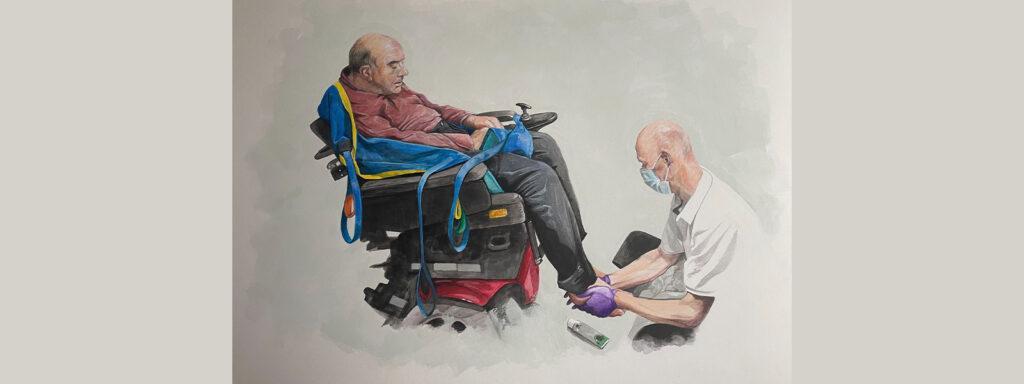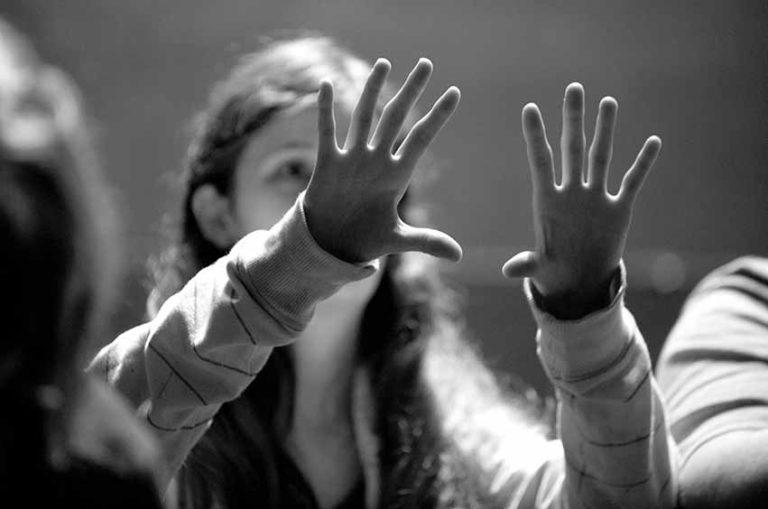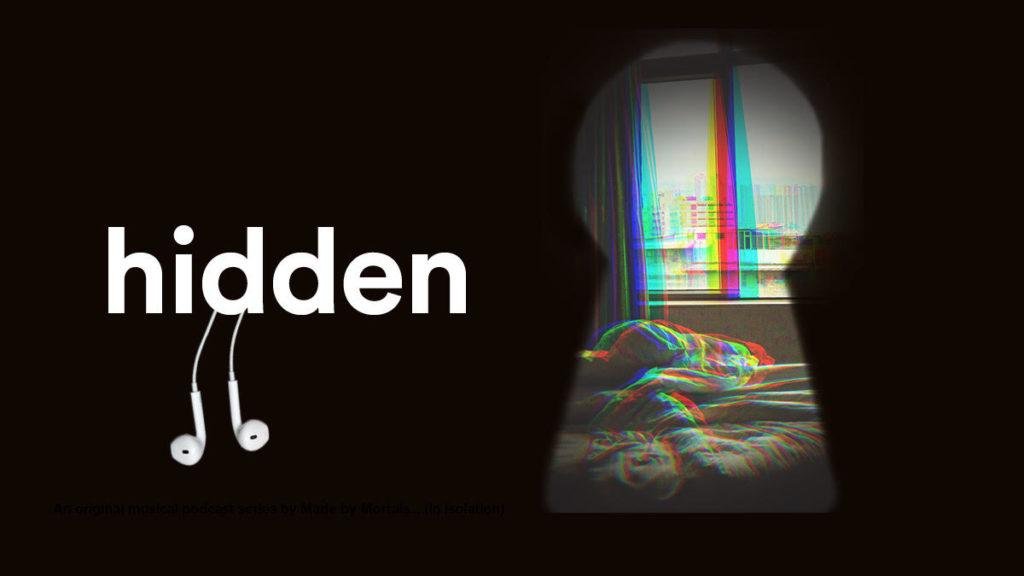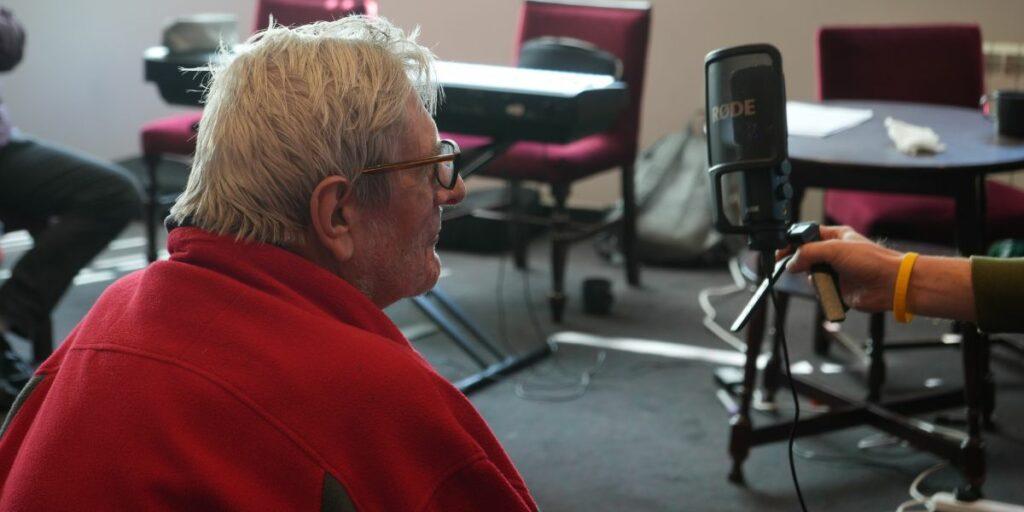
A blog exploring ways in which participatory arts practice can inject more empathy, humanity and beauty into the care system.
Paul Hine- CEO of Made By Mortals
I recently went to an event called Beautiful Care. Beautiful Care invited different stories of care into the Whitworth Art gallery in Manchester. The event included an original performance piece composed of interviews with carers explaining the beauty of their work. The performance was followed by a panel and Q and A session discussing the relationship between the arts and the art and craft of care.
“My first thought was that beauty seems such a strange word for care. But then when I started looking into it …”
The opening line of the ‘Beautiful Care’ performance.
Beautiful Care challenged the audience to ask how would care change if it were guided by a sense of beauty? This event came from the team behind the Care Project led by Professor James Thompson at The University of Manchester. The project is striving to discover what would happen if we considered care as a craft or artful practice.
‘Nursing (care) is an art: and if it is to be made an art, it requires an exclusive devotion as hard a preparation, as any painter’s or sculptor’s work; for what is the having to do with dead canvas or dead marble, compared with having to do with the living body…. ?- Florence Nightingale
As a participatory theatre maker (someone who makes theatre with ‘real people’ and not just professionals), I was struck by the link between the skills involved with the theatre making process and the caring process highlighted by the Beautiful Care event. It was fascinating to hear and connect with the skill and craft a good carer has. It was clear to me that this skill and craft allows and generates space for ‘beautiful’ moments to come about- very much as it does within theatre.
For example, my reflections on the connections between both ‘artforms’ included:
Communication without words- eye contact and reading body language is essential to both caring and stagecraft.
Technical skill- perfecting lifts and movements with inch-perfect accuracy ensures a patient can enjoy maximum comfort in a new position or within theatre creates aesthetics and imaginary that can wow an audience.
Timing- judging the exact moment when it is best to act so you can achieve the biggest impact or raise the widest smile.
Letting the spotlight shine on others- leaving space for others to do the things they can do even though you could have done them more easily.
Imaginative spontaneity- within Beautiful Care we heard a story about a carer who suddenly inspired a whole room full of people to get into bed with a dying man and sing ‘We Are The Champions’ by Queen. If that’s not theatrical I don’t know what is?

“There’s pride and there’s empathy in beautiful care. Loud empathy and quiet pride”
A line from the performance and a direct quote from a carer.
The Q and A afterwards was also fascinating. There was a focus on how we get more empathy and humanity in the system. We discussed the many barriers to this that exist and get in the way of ‘beautiful acts of care’ happening – low pay, lack of time, turnover of staff, and too much bureaucracy, for example. A man in his mid 70s spoke up towards the end of the event. He spoke passionately about the blight of industrialisation within the care industry and the perpetual culture of getting more from less. He also had a message for those younger than him “let me assure you that care has not always been like this”.
The event left me again considering how I can use my practice to help inject more empathy and humanity into the care system. Is it possible to teach someone to ‘care’ more using the arts? My job as a theatre maker is to help people feel and think and connect. With this in mind, I strongly believe that this is possible. I also believe that this is possible within the current system whilst at the same time supporting systemic change. Throughout the pandemic and beyond, Made By Mortals has supported a broad range of underserved people, many in the care system, to cocreate (what we call) immersive audio case studies.
This work is part of our ‘Hidden’ programme, which aims to shine a light on the hidden struggles people are experiencing behind closed doors. The programme challenges people to take a walk in someone else’s shoes using their own homes and lives as a theatrical set for the experience. Each case study lasts around 15 minutes in length and is coproduced by groups of underserved people using their imaginations and lived experience.

“It gives you a sense of belonging and I feel a part of society in which I used to feel like I didn’t fit in”
Michelle, aged 30, participating remotely in ‘Hidden’ from a mental health unit.
Each group collaborates with professional writers, directors, actors and sound engineers to produce their episode. Within each episode, the listener (carer) meets a fictional character (devised by the group) at a point of crisis and/or transition. Through listening to each episode the listener gets to understand the makers lives as well as the fictional character. The listener is also challenged to reflect on their own situation in relation to the character as well moving around their own homes and speaking out loud. The listener’s experience is heightened further using music and sounds also coproduced by the group. The aim of each piece is to move the listener into a place of compassion, connection and openness and then challenge them to help (care for) the character they meet.
Have a look at our Hidden Theory of Change here.
Below are four anonymous quotes taken from carer’s feedback as part of a series of ‘Hidden’ sessions with Tameside Hospital.
“What really stood out for me was the opportunity to reflect with a colleague and then to share our conversations with others. This brought together personal experiences which enriched what was delivered.”
“It was interesting in the change of the use of language and thought-provoking in challenging the systems in place for our convenience.”
“I reflected on how we all have a part to play in a patients journey and the impact our behaviour has on them.”
“I learnt that I can use my own experiences to better support others around me.”
"We wanted to do something that was different and was not a ‘training’ event. This was so people could have time to think, reflect and immerse themselves in someone else’s life. The aim of this was for staff to develop an awareness of the challenges and barriers that people from different backgrounds experience, and then for them to talk about how they can respond to these in their own professional practice. By having time to actively listen, think and then talk about the differences they could make, we wanted to develop a basis of understanding that can inform each individual’s future practice.' Rob Conyers, Head of Patient Experience at Tameside Hospital."

Our professional artists and community participants make the immersive case studies together using many of the artistic skills I now realise they share with the carers they have been created for.
At Made By Mortals, we are constantly striving to enhance the artistry of both the professional artists and underserved communities we support. Our theory is the better quality the art the more likely carers are to be moved by the experience and more likely they are to make person-centred adaptions to their practice.
We have already experienced some modest success injecting empathy and humanity into the care system through using our ‘Hidden’ programme. We have evidence that participatory arts practice can help people ‘care’ more. From my recent visit to Beautiful Care however, I now think it is time we adapted our own practice to consider how we can support and highlight the artistry of the carers and the care professionals involved in the programme.
Our work already looks to blur the lines between ‘performer’ & ‘audience’, ‘participant’ & ‘researcher’, ‘service user’ & ‘service provider’ and aims to ‘flip on its head’ traditional power structures. This supports people with lived experience, into a place of leadership and expertise to share, create and offer insight from. The line between ‘carer’ and ‘artist’ has now also been permanently blurred for me. I see a power in helping blur it for others and will aim to use participatory arts practice to do just that. Playing a small part in creating a care system guided by a sense of beauty crafted by highly regarded empathetic and profoundly humane caring professionals.
James Thompson, one of the creators of Beautiful Care, has a book! For more details click here.
